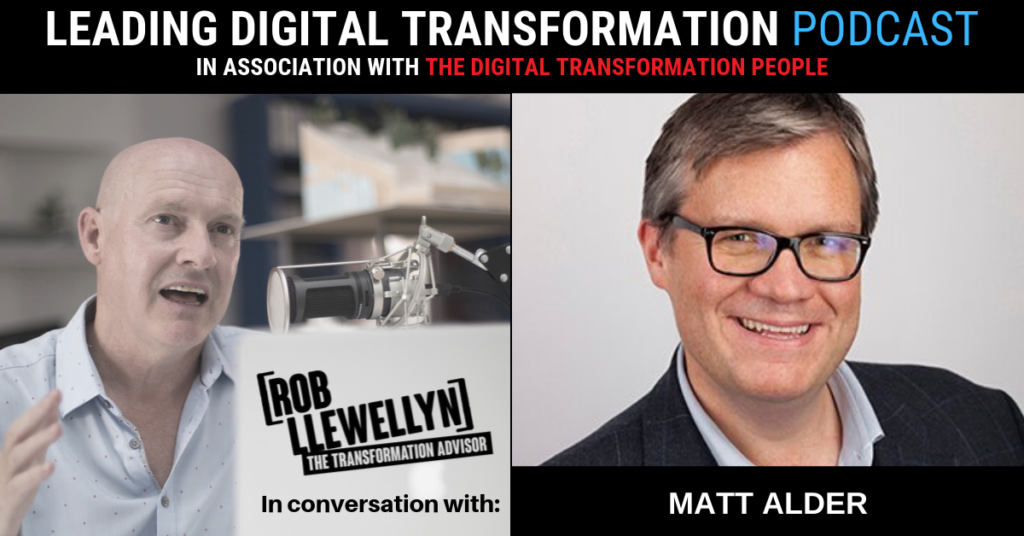‘Leading Digital Transformation’ is a weekly podcast series produced in collaboration between The Digital Transformation People and Rob Llewellyn digital transformation advisor and founder of CXO Transform.
During this series, Rob interviews experienced practitioners, authors and thought leaders whose stories and experiences provide valuable insights for digital transformation success.

In this episode, Rob speaks with Matt Alder, host to The Recruiting Future podcast, keynote speaker and co-author of the acclaimed book “Exceptional Talent” and soon to be published “Digital Talent”. Matt is a renowned thought leader in the world of talent acquisition and is particularly interested in Digital Transformation, the talent and skills required to achieve it and the digital transformation of the HR and talent acquisition that is necessary if they are to play their part as architects in the future of work.
“I can’t think of two better people than Mervyn Dinnen and Matt Alder to document how the talent journey and the world of human resources is being disrupted in the digital age.” David Green, Global Director, People Analytics Solutions, IBM Watson Talent 2017-03-20
Listen here and read the full transcript below.
Transcript
Rob Lewellyn [00:00:22] Hi, and welcome back. I’m joined today by Matt Alder. Matt’s an expert in talent acquisition strategy and he’s also the host of the “Recruiting Future” podcast, which is one of the world’s most listened-to podcasts on recruiting innovation. And in every episode, Matt interviews thought leaders and practitioners influencing and changing an industry. He’s also in the process of writing a book. And that’s scheduled to be out in April 2020 and we’ll ask Matt about that in just a moment. So without further ado, let’s jump into the interview with Matt. Matt, welcome.
Matt Alder [00:00:59] Hi, Rob. A pleasure to be on the podcast.
Rob Lewellyn [00:01:02] Great to have you here. Matt, as I just mentioned in the introduction, you’re writing a book called “Digital Talent” and it’s out in April 2020, I understand. Tell us why you decided to write a book because it’s a pretty big undertaking and what the nature of the book is.
Matt Alder [00:01:19] Absolutely. So, it’s actually my second book. I write my books in collaboration with a very good friend of mine Mervyn Dinnen, who’s an H.R. strategy consultant. And the reason that we’re writing this book is we’ve been fascinated to see all the contenders out there about digital transformation. Obviously something important to pretty much every company. Lots and lots of things written about everything from technology to structure to all that kind of stuff, but not much written about the actual people side of digital transformation, the type of people that you might need in your business, how you get them, how you manage, how you manage all that change. So, we embarked on writing this book to fill what we see as a gap in the market, in that lots of talk about digital transformation, not much talk about talent for digital transformation.
Rob Lewellyn [00:02:13] Okay. And let’s move on to talent a little bit. You’ve been in the recruitment business for a long time, around two decades. What have you learned about demand for skills and talent, specifically in relation to digital transformation? I mean, is it different from times in the past perhaps, where circumstances have increased demand for specific skills?
Matt Alder [00:02:34] Yeah, it’s really interesting and it’s something I’ve followed through my 20 years of recruitment very, very closely, either working with companies who are looking for various evolving types of digital talent, or indeed the sort of the first half of my career in this industry, I was working for various recruitment marketing agencies and I was actually building their digital team. So, I was very much on the search for digital talent and seeing how required skills evolved and all that sort of stuff. I think that the period we’re going through now is very different. I think in the past, one of the (without giving too much of our book away), one of the parallels that we draw very early in the book is looking at what happened around the millennium bug, when there was a massive spike in demand for a particular sort of technical skills and that spike continued as we went into the new century with the e-commerce revolution and all those sorts of things. Well, what I think is different this time, back then the types of talent and the types of skills that were needed were quite clearly defined. And at the same time, certainly, with the millennium bug, there was a time limit to it that focussed people’s minds. I think with digital transformation now, it’s all about continuous evolution. And many companies still don’t perhaps understand the type of talent that they need, where as soon as they’ve got to grips with it that the types of skills and the types of talent change and it’s kind of it’s very evolving and very unstructured and very undefined. I think that makes it a real challenge. The other aspect of it is companies really need two different sets of people. And this is something that a couple of my clients have talked to me about. You know they need people who are going to be able to manage the change of transformation, to help them take an old business model and an old structure into the new world that we’re living in. But are these people that change then the right people to actually take the business on from there? So, one client, in particular, I’m working with has actually almost having to reinvent their workforce twice, to bring people into to change the business and then bring people in who can take the business forward from there. So, I think it’s very different. And I think it’s a very, very challenging time for employers when it comes to talent.
Rob Lewellyn [00:04:50] Matt, you and I, we both host podcasts and we both speak to a lot of different experts on a regular basis and also going in and out of different organisations. So there are a lot of different perspectives out there on digital transformation. How is digital transformation viewed from a perspective of H.R. professionals and what role do you think they should be playing to achieve it?
Matt Alder [00:05:15] Well, to answer the second part of that question first, they should be playing a much bigger role than they’re currently playing. To me, I think that digital transformation is a massive challenge and a massive opportunity for H.R… It’s all about, from my perspective, it’s all about the people in the business who are going to drive the business forward and if it’s about people, that should be something that H.R. is front and centre at. In terms of H.R.’s role in this and what I’m seeing, I think there are two things. I think there’s the obviously driving the people strategy, to make sure that companies have the right skills, in the right place, at the right time. And that might not just be about recruiting people, it could be about tapping into their gig economy or having the right kind of bank of skills that they can access on-demand, lots and lots of different ways of shaping the workforce and thinking about talent. And I think H.R. needs to play a big part in that. And I’m seeing a number of H.R. professionals who are doing that but perhaps not as many as perhaps should. And I think the other aspect and the other challenging part of digital transformation and for H.R. is having to digitally transform itself. So the way it works, the way it thinks, the systems and processes and technologies that are now available and giving the companies that are using them a cutting edge. So, really I think it’s a complicated thing. I think it’s about supporting the “people aspect” of the digital transformation of the business, but also digitally transforming the way H.R. works itself. So it’s a dual challenge for H.R.
Rob Lewellyn [00:06:45] Matt, I just want to pick up on something which you mentioned and you’ve said that some H.R. departments are embracing new ways of working better than others. Tell us what you think the challenges are for those organisations where it’s a bit of a struggle for H.R. to adopt new ways of working for the new type of world that we’re working in now.
Matt Alder [00:07:05] Yeah, I think a lot of it depends on the work that H.R. department has traditionally done, how strategic they are, how involved they are in the strategy of the business. Some companies will have built H.R. departments that are very reactive, that are there to mitigate risk, which is obviously a big part of H.R.’s job and haven’t necessarily been given the opportunity to input into the strategy of the business. And I think it’s very much about the leadership of the business, tapping into the expertise or bringing expertise in people strategy into the business, to really kind of drive it forward. So, I would really put that challenge on the leadership of the business in terms of making sure that they have the right kind of H.R. set up and the right skills within their H.R. department and they give those H.R. professionals the right access to influence the strategy of the business. So, I think it’s a leadership challenge to make sure that people are – the people strategy is positioned alongside the other aspects of their digital transformation strategy.
Rob Lewellyn [00:08:09] Sure, makes sense. Matt, a lot of organisations compete for technical skills to help them with the digitisation of their businesses. You’ve got artificial intelligence, blockchain, etc, etc, but what do you think are the people and leadership skills that are required to deliver successful transformation?
Matt Alder [00:08:28] Yeah, that’s an interesting question and probably one that we could talk about for hours and hours and hours. So, I mean I suppose to sort of pick up a few things, I think that we have to recognise that for many employers, this is a time of dramatic change. And having the right leadership and the right culture to manage that change is absolutely critical. I think high levels of transparency coming from the leadership within a business is absolutely critical. And also, building trust and building psychological safety rounds to the changes taking place and also the input that’s required from the people is critical. I mean, to explain that a little bit more, I think one of the things that is really interesting about digital transformation is that the companies who are really leading the way are recognising that it’s not just about bringing people into their business with the right skills. It’s about bringing people into their business who perhaps have a different mindset to people they’ve recruited in the past. So, people who are entrepreneurial, people who are disruptive, people who are going to really help mould and make the company work and behave differently. And I think that lots of companies recognise that and lots of companies are looking for people with different types of backgrounds to what they’ve recruited before. But I think there’s a real challenge when it comes to leadership and culture there, because while companies might understand that they need people who think differently, that has an impact on the culture, the way those people are managed within the business, if they’re going to get the most out of those kinds of changing mindsets. So, I think there are lots of things to it. But I think trust and transparency and the sort of continual management of change and also building a diverse culture that is going to be a magnet to the right types of talent is critical as well, because as I said earlier, this may not be recruiting people on full-time contracts, it’s getting the right freelancers and contractors to work for you in a very competitive market and making those people feel that they fit in and they’re adding value and going over and above themselves straight away. So I think it’s a big challenge. But that sort of trust and transparency and managing change would be the big things for me.
Rob Lewellyn [00:10:45] And I think just building on that a little bit, Matt, I think another important factor is – we’ve mentioned the people and the leadership skills required to deliver transformation. And it’s one thing expecting leaders and senior managers to adopt a new way of thinking, etc. But when organisations bring in people who think differently, they also have to work with the wider workforce, who don’t necessarily adopt the same mindset as leaders. What are your thoughts on that?
Matt Alder [00:11:13] Yeah, absolutely. And that for me is the biggest challenge. And you know I’ve seen that firsthand in organisations that I’ve worked in, where in the early part of my acquisition career when I was working in the marketing side of the business, I was building digital teams within established agencies, bringing in people who thought differently. And it’s a massive challenge. How do you bring people along with you? How do you get the best out of people who have great experience and skills? And I don’t think there’s an easy answer. I don’t think there’s an easy answer to it, but I think that recognising that it is a challenge and continually working to solve it is probably key here, because I think that a lot of companies don’t necessarily acknowledge publicly to their employees that that is an issue and something that they’re going to have to work through.
Rob Lewellyn [00:12:04] Matt, as organisations now compete for the skills they need to leverage emerging technologies, what talent acquisition strategies have you found to be most effective in attracting the right talent into an organisation?
Matt Alder [00:12:18] So, it’s a really interesting time. The reason I say that is there’s an unprecedented amount of investment, particularly VC investment, going into talent acquisition technology at the moment. So, the market for acquisition technology is absolutely crazy. Every week someone’s launching a new tool or new technology, which is being touted as the silver bullet that’s going to solve everyone’s talent acquisition issues. So, you’ve got this really crazy technology-driven market for talent acquisition at the moment. When you step back from that and look through the marketing spin and see what’s actually working, you kind of see what the problem is and the problem is there aren’t enough people with the right skills to fill the roles that people are looking for in very short timescales. So it’s highly competitive and it’s also very, very noisy. If you have desirable skills in this industry, so trends change, but for a moment say you’re a high-level data scientist. You could literally pick which company you wanted to work for. So the challenge for employers is actually being heard, it’s actually getting the attention of the talent they want in their business and then persuading those people that this is the right opportunity for them. So, what I’m seeing working is the companies who are really focussing on understanding those target audiences. How do we actually find these people, how do we speak to these people? How do we get their attention? And then how do we tell our story as an employer in a way that’s compelling and honest and is going to persuade someone that we’re the right employer for them? And that’s a lot of focus on talent intelligence and employer branding and effective storytelling, effective marketing, converting interest into applications. It’s a really, really interesting time to be in talent acquisition and I think that for me, whilst there are some companies who are doing amazing things and I’m lucky that lots of them come on my podcast and talk about it, I think that generally speaking, it’s something employers really need to up their game with. I think that if you look at the really bad job adverts that are kind of pumped out there are just job descriptions that don’t really sell businesses or sell culture or sell opportunity, there’s still too much of that going on and not enough of strategic thinking rounds talent attraction.
Rob Lewellyn [00:14:51] Matt, what gaps do you see in the talent acquisition armoury? Is there a need for external suppliers and what services do you feel offer the most value to the modern corporate?
Matt Alder [00:15:02] Well, obviously there’s a need for external talent acquisition strategy consultants like myself! Seriously, I think there is a need for companies to be able to take a step back and reflect and look at the whole market and really understand what the competitors are doing. In the supply side of things, I think one of the interesting debates that seems to have been going on for as long as I’ve been working in this industry is the use of recruitment consultants and recruitment agencies and head-hunters. And 20 years ago, we heard that the Internet was going to kill all those businesses and their demise has been overstated ever since. So, what you find now is that most employers, particular employers who are looking for technical skills and other associated digital translation skills, will have their own in-house recruitment setups and operations. However, I think there is still a tremendous need for very, very, very good head-hunters and recruitment agencies, because things move very quickly. For large companies, it’s very, very difficult. Sometimes I think for their in-house teams to develop the expertise they need in every kind of single role, a lot of the talent that’s out there is hiding itself from the market and actually understanding where the right people are is a great skill that good recruitment agencies have. So, I think that there is still a big opportunity for recruitment agencies as suppliers to the industry. However, they’ve got to be very, very good. They’ve got to work in partnership with the employers that they support and they’ve got to be absolute domain experts in what they do. I think the time of the generalist recruitment agency is passing and I think that companies are actively seeking out people who can supply talent to them, who really, really understand the market and can kind of bridge those conversations between the employer and the top talent that’s out there.
Rob Lewellyn [00:17:05] Matt, I want to talk about the future of work and the future of talent. Back towards the end of last year, I was down in Oman and I was speaking to an audience of about five or six hundred H.R. professionals and a lot of them were concerned about our machines going to be playing a role in the future. How much realistically can be achieved by machines in the future and what will the future of work look like for the good old fashioned human being?
Matt Alder [00:17:32] Yeah, it’s the question of the moment. On my own podcast, I have someone come and talk about the future of work probably sort of every six or seven weeks and everyone you ask has a slightly different view about how it’s going to pan out. And there seem to be two extremes. There’s the extreme where we bow down to our robot overlords and there’s no work for anyone to do. And the other extreme is that nothing’s going to change and things are going to stay the same. So it’s an interesting question. Obviously it’s a question that is of great interest to H.R.. I think that it’s going to be interesting to see how it pans out. I suppose the best way to answer it is for me to talk about what I really know, which is what’s going on in the recruiting industry at the moment. So, in the recruiting industry itself, there is a massive debate about how – is there a role in the future for recruiters or will they be automated? Will all of this stuff happen automatically by robots and the human role of a recruiter won’t exist anymore? And I think it’s an interesting debate and what’s happening at the moment is lots of companies are launching technology that allegedly automates their recruitment process, but it’s actually not very good. And it doesn’t actually do a great job and the technology that we need to automate their recruitment process isn’t necessarily there where it needs to be. And also the understanding of how the process actually works, what the human input is into it and how that can be automated is still evolving. So I think we’ve got a long way to go. So you could look at recruitment and say “well, you can’t possibly automate this, because people are trying and they’re failing”. And that would be the wrong way to look at it, because to me, automation is a done deal. It’s going to happen, it’s absolutely inevitable. We’re seeing automation in everything that we do, and even if humans can do something better, if you can automate it to 80 percent of that quality, then it’s going to get automated. So, I think in the future that they will crack how to pull apart and automate their recruitment process. Will there be a role for humans? Absolutely they’ll be a role for humans. It’s a very human business. Ultimately, it’s about persuading people to move jobs. That’s all about relationships, it’s a very, very human aspect. So, I would expect to see in my industry that much of the stuff that’s done by humans at the moment will be automated. However, there is a real human role going forward. Perhaps operating at a kind of a higher relationship-building and persuading-and-selling level, things will look very different in a few years time.
Rob Lewellyn [00:20:07] Matt, this is a fascinating topic and it’s been terrific speaking with you about it today. We’re going to have to wrap it up there. Where can people go to learn more about what you’ve been speaking to us about today?
Matt Alder [00:20:20] So, I think the best place to go is my podcast, because I interview great people on these topics all the time. You can find the podcast wherever you subscribe to podcasts. It’s called “The Recruiting Future” podcast or you can go to its website, which is RFpodcast.com.
Rob Lewellyn [00:20:38] Matt, thank you and we’ll put a link to that in the show notes. Thanks again for your time, Matt.
Matt Alder [00:20:43] Thanks very much for having me on the show.
Announcer [00:20:45] We hope you enjoyed this episode of “Leading Digital Transformation” with Rob Llewellyn and The Digital Transformation People. Visit www.thedigitaltransformationpeople.com to secure the knowledge, talent and services you need for digital transformation success. To continue your journey as a certified transformation professional, visit www.RobLlewellyn.com. Be sure to subscribe to the podcast and follow us on Twitter at @TheDigitalTP and @RobertLlewellyn.
Article by channel:
Everything you need to know about Digital Transformation
The best articles, news and events direct to your inbox






